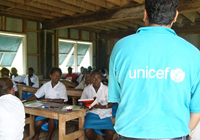 In 2012 Jo and I travelled back to the Solomon Islands with UNICEF NZ. As well as checking the quality of work on the schools project we had jointly funded, we took time to understand the wider context of development work in the Solomons by visiting a number of health projects and talking with their staff and patients. This has given rise to our next project in the Solomons. In conjunction with UNICEF NZ we wish to make a difference to family health by implementing some initiatives for mother and newborns and family planning.
In 2012 Jo and I travelled back to the Solomon Islands with UNICEF NZ. As well as checking the quality of work on the schools project we had jointly funded, we took time to understand the wider context of development work in the Solomons by visiting a number of health projects and talking with their staff and patients. This has given rise to our next project in the Solomons. In conjunction with UNICEF NZ we wish to make a difference to family health by implementing some initiatives for mother and newborns and family planning.
Included in our trip was a visit to the maternity ward in Honiara’s busy hospital. Every bed was filled with mums and new babies, some of them only a few hours old. At that time those babies looked healthy, but I wonder today, exactly a year on, how many of those new-borns have actually made it to their first birthday.
That might sound harsh, but the reality is that babies in the Solomon Islands are almost four times as likely as babies in New Zealand to die within their first critical 28 days of life. While child mortality in general is improving in the Solomons Islands, in 2011 around 50% of all child deaths were new-borns. And many of these new arrivals are dying from simple childhood illnesses which are both preventable and treatable, such as low birth weight and diarrhoea.
The Solomon Islands is ranked ‘low’ on the Human Development Index at 142 of 187 countries. All other Pacific countries (apart from PNG) are ranked as ‘medium’. Almost a quarter of people in the Solomon Islands live below the poverty line. Many live in remote areas where there is limited health care and facilities. For pregnant mums-to-be this is where many of their baby’s problems begin.
At least the women we met in Honiara were fortunate to give birth in a hospital. But in the outer islands we encountered women giving birth in villages with no health facilities – a situation that threatens their life and that of their unborn baby.
More babies in the Solomon Islands would survive if women had more support before, during (such as, at least four antenatal visits) and after their pregnancies. But with only around one obstetrician per 125,000 people in the Solomon Islands (compared to one per 10,000 in New Zealand), a lack of skilled health workers and a limited amounts of drugs this is a real challenge.
UNICEF has spent decades working in countries around the world using tried and tested methods to improve maternal and newborn health. And this is what they know will work: giving mums better access to antenatal and post natal care including in rural areas, supporting mums to breastfeed, improving healthcare at births and for newborns, supporting families in their communities, and giving families better access to information on voluntary family planning. More effective birth control options are essential if the support for newborns is going to be sufficient.
In essence, it’s about having highly skilled health workers who can give mums and newborns access to community-based care and advice on areas such as breastfeeding, assessment for danger signs, information on birth registration, and vaccines….and so much more.
As Ambassadors of UNICEF, Joanne and I believe so strongly in this that we are matching every dollar raised by UNICEF NZ to implement an integrated package of interventions to be phased in over the next 3 years. This will dramatically increase the chances of a normal pregnancy and childbirth for mums, and greatly improve the health of their babies.
But this project is not only about the immediate survival for mums and babies, it is also about ensuring that Solomon Islands children thrive in the long-term. Children make up around half the population of the Solomon Islands, so we need to ensure they have the best chance of growing up into productive and healthy adults. Put bluntly, families don’t have enough access to family planning services often resulting in large families, putting too much pressure on the families and the limited health care facilities that the Solomons have.
If babies don’t receive the right healthcare and nutrition from day one, they may be storing up a host of future problems like stunting, mental disabilities and other complications. One third of children in the Solomon Islands are stunted and not properly developed for their age. Stunting ensures that the cycle of poverty is intergenerational and is hard to break.
Working with UNICEF we need to raise US$1.3million over the next 3 years to complete this work (which will be implemented in tandem with other UN and Solomon Islands government partners). Just as we did with our project to rebuild dilapidated schools in the Solomon Islands, we will also be tracking the progress on this project to ensure that every Kiwi dollar is utilised well.
Whatever you donate we will match it: find out more at: www.unicef.org.nz/solomons

